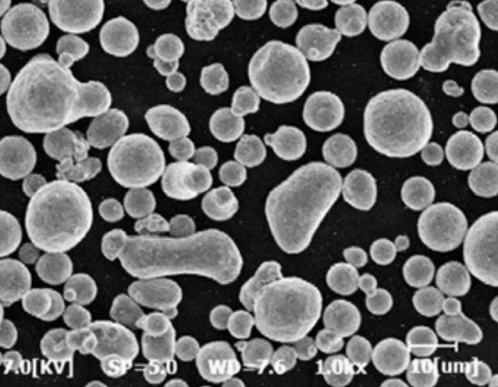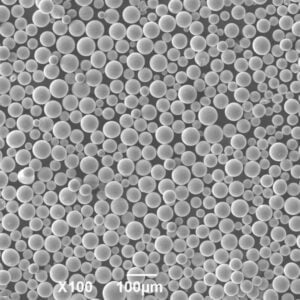
Al 7075 powder
Overview of Al 7075 Powder Al 7075 is one of the highest strength 7000 series aluminum alloys, offering strength superior to many steels. Zinc is the main alloying addition while magnesium imparts strength through precipitation hardening. Key properties of Al 7075 powder include: Exceptionally high tensile and yield strength High hardness and good fatigue strength…
Small MOQ
Flexible sourcing for hundreds of products
Customization support
Customized powder according to industry
Rapid shipment
By DHL Express, safe and fast direct to your hands
Overview of Al 7075 Powder
Al 7075 is one of the highest strength 7000 series aluminum alloys, offering strength superior to many steels. Zinc is the main alloying addition while magnesium imparts strength through precipitation hardening.
Key properties of Al 7075 powder include:
- Exceptionally high tensile and yield strength
- High hardness and good fatigue strength
- Good toughness and moderate ductility
- Excellent finishing characteristics
- High corrosion resistance
- Available in range of powder sizes and shapes
Al 7075 powder is ideal for high-performance aerospace and defense components needing the optimal combination of strength, hardness, fatigue resistance, and moderate weldability.
Chemical Composition of Al 7075 Powder
The typical chemical composition of Al 7075 powder is:
| Element | Weight % |
|---|---|
| Aluminum (Al) | 87.1-91.4% |
| Zinc (Zn) | 5.1-6.1% |
| Magnesium (Mg) | 2.1-2.9% |
| Copper (Cu) | 1.2-2.0% |
| Iron (Fe) | 0-0.5% |
| Silicon (Si) | 0-0.4% |
| Manganese (Mn) | 0-0.3% |
| Chromium (Cr) | 0.18-0.28% |
| Titanium (Ti) | 0-0.2% |

Zinc is the primary alloying element while magnesium and copper enhance strength through precipitation hardening. Trace elements like iron, manganese, chromium have minor effects.
Properties of Al 7075 Powder
Key properties of Al 7075 powder include:
| Property | Value |
|---|---|
| Density | 2.81 g/cm3 |
| Melting Point | 477ÿ635¡«C |
| Thermal Conductivity | 130ÿ210 W/mK |
| Electrical Conductivity | 22-30% IACS |
| Young’s Modulus | 71ÿ72 GPa |
| Poisson’s Ratio | 0.33 |
| Tensile Strength | 570ÿ635 MPa |
| Yield Strength | 505ÿ570 MPa |
| Elongation | 7ÿ10% |
| Hardness | 150ÿ190 Brinell |
The zinc additions result in extremely high strength and hardness while maintaining reasonable ductility and toughness. The alloy has excellent finishing characteristics.
Production Method for Al 7075 Powder
Commercial production methods for Al 7075 powder include:
- Gas Atomization?- Molten alloy stream disintegrated by inert gas jets into fine spherical powder particles with controlled size distribution.
- Water Atomization?- High pressure water jet used to produce fine Al 7075 powders with irregular shape. Lower cost but higher oxygen pickup.
- Mechanical Alloying?- Ball milling a blend of aluminum and alloying element powders followed by cold compaction and sintering.
Gas atomization offers superior control over powder characteristics like particle size, shape and microstructure.
Applications of Al 7075 Powder
Common applications of Al 7075 powder include:
- Additive Manufacturing?- Used in selective laser melting, direct metal laser sintering to produce complex, lightweight aerospace and defense parts.
- Metal Injection Molding?- To manufacture small intricate components with high strength and moderate corrosion resistance.
- Powder Metallurgy?- Press and sinter process to create high-performance automotive parts and machinery components.
- Thermal Spraying?- Wire arc spraying to deposit very hard and wear resistant Al 7075 coatings.
- Pyrotechnics?- Added as fuel constituent in pyrotechnic compositions due to its high reactivity.
- Welding Filler?- Used as filler wire providing weld strength but limited weldability.
Specifications of Al 7075 Powder
Al 7075 powder is available in various size ranges, shapes, grades and purity levels:
- Particle Size:?From 10-45 microns for AM methods, up to 120 microns for thermal spray processes.
- Morphology:?Spherical, irregular and mixed particle shapes. Smooth spherical powder has better flowability.
- Purity:?From commercial to high purity grades tailored for the specific application.
- Grades:?Conforming to ASTM B951, AMS 4045, AMS 4282, EN 573-3 and other equivalent standards.
- Oxygen Content:?Varies between 500-1500 ppm based on production method. Lower is better.
Global Suppliers of Al 7075 Powder
Some of the major suppliers globally are:
- Sandvik Osprey (UK)
- TLS Technik (Germany)
- Valimet Inc. (USA)
- CNPC Powder (China)
- Makin Metal Powders (UK)
- PyroGenesis Canada
- Metal Powder Company (USA)
These companies produce Al 7075 powder suitable for various applications using different manufacturing processes.
Al 7075 Powder Pricing
Pricing of Al 7075 powder depends on factors like:
- Purity levels
- Particle characteristics
- Powder production method
- Order quantity
- Supplier and geographical location
| Grade | Price Range |
|---|---|
| Commercial | $10-20 per kg |
| High purity | $20-40 per kg |
| Ultrafine | $40-80 per kg |
| Special grade | $80-150 per kg |
Gas atomized, controlled particle size, high purity powders command much higher pricing than simple commercial grade Al 7075 powder.
Storage and Handling of Al 7075 Powder
Al 7075 reactive alloy powder must be handled with care to prevent:
- Oxidation and reaction with moisture
- Dust explosion hazards from fine powder
- Inhalation related health problems
- Safety practices recommended by supplier should be followed
Inert gas blanketing, proper grounding, ventilation, and PPE should be utilized for safe handling.
Testing and Characterization Methods
Key test methods used for Al 7075 powder include:
- Chemical composition analysis using OES or XRF
- Particle size distribution as per ASTM B822 standard
- Morphology analysis through SEM
- Powder flow rate using Hall flowmeter
- Density measurement by helium pycnometry
- Impurities testing by ICP-MS
- Microstructure examination by X-ray diffraction
These tests ensure the powder meets the required chemical, physical, and microstructural characteristics for the specific application.
Comparison Between Al 7075 and Al 6061 Powder
Al 7075 and Al 6061 are two aluminum alloy powders compared:
| Parameter | Al 7075 | Al 6061 |
|---|---|---|
| Alloy type | Heat treatable | Heat treatable |
| Zn content | 5.1-6.1% | 0% |
| Mg content | 2.1-2.9% | 0.8-1.2% |
| Strength | Much higher | Moderate |
| Machinability | Poor | Excellent |
| Weldability | Poor | Very good |
| Corrosion resistance | Moderate | Excellent |
| Cost | Higher | Lower |
Al 7075 offers very high strength whereas Al 6061 provides better corrosion resistance, weldability and machinability at lower cost.
Al 7075 Powder FAQs
Q: How is Al 7075 powder produced?
A: Al 7075 powder is commercially produced using gas atomization, water atomization, mechanical alloying and electrolysis techniques. Gas atomization offers the best control of particle characteristics.
Q: What are the main applications for Al 7075 powder?
A: The major applications for Al 7075 are additive manufacturing, thermal spray coatings, powder metallurgy parts manufacturing, metal injection molding, and pyrotechnic compositions requiring exceptionally high strength.
Q: What is the recommended particle size for Al 7075 powder in AM?
A: For most metal 3D printing processes, the ideal particle size range for Al 7075 is 15-45 microns with spherical morphology and good powder flowability.
Q: Does Al 7075 powder require any special handling precautions?
A: Yes, it is recommended to handle reactive aluminum alloy powders carefully under inert atmosphere using proper grounding, ventilation and PPE.
Q: Where can I purchase ultrafine Al 7075 powder suitable for aerospace components?
A: High purity, gas atomized ultrafine Al 7075 powders meeting aerospace requirements can be sourced from leading suppliers such as Sandvik Osprey, TLS Technik, and Valimet Inc.
Contact us now
Please contact us for recent product quotes and stock availability.
